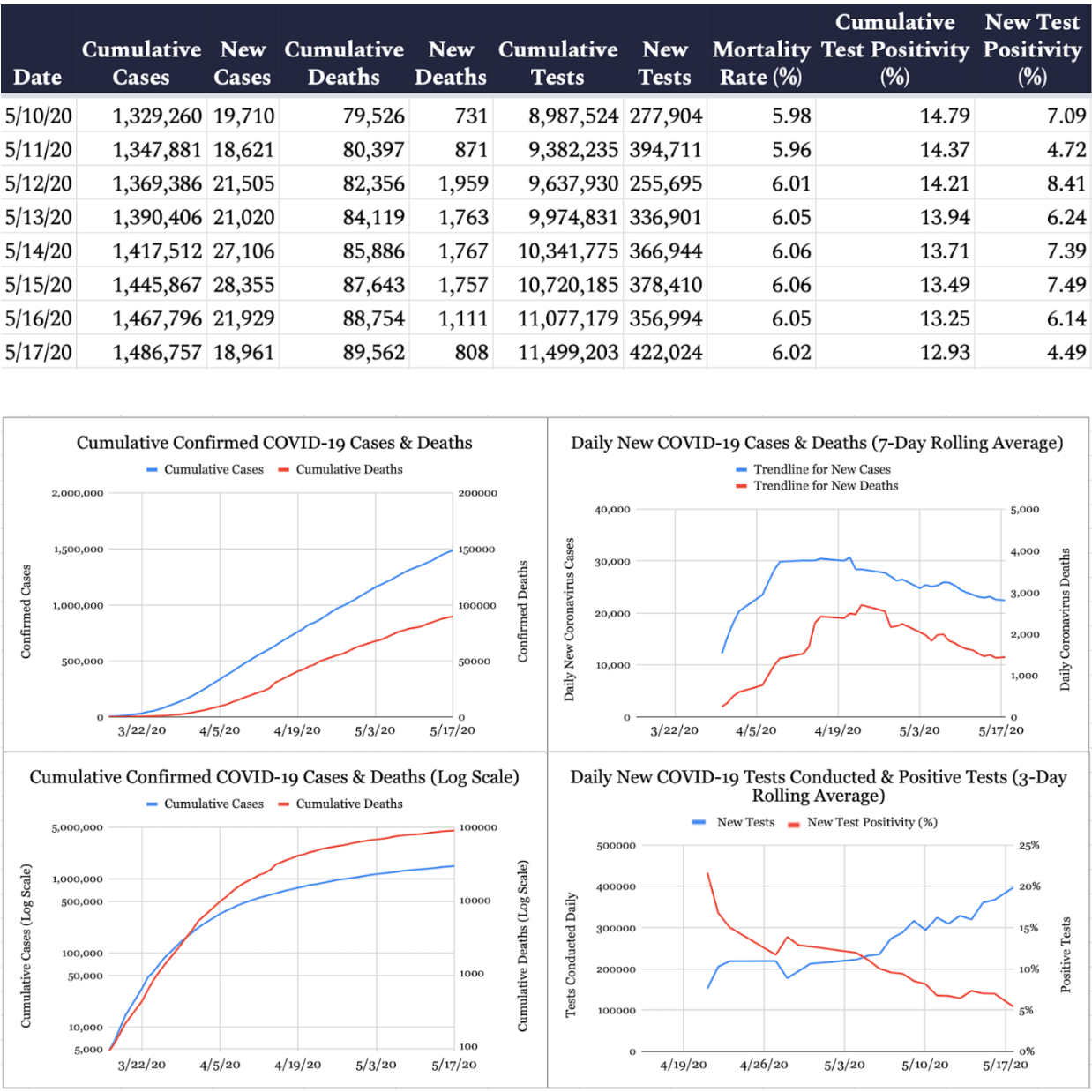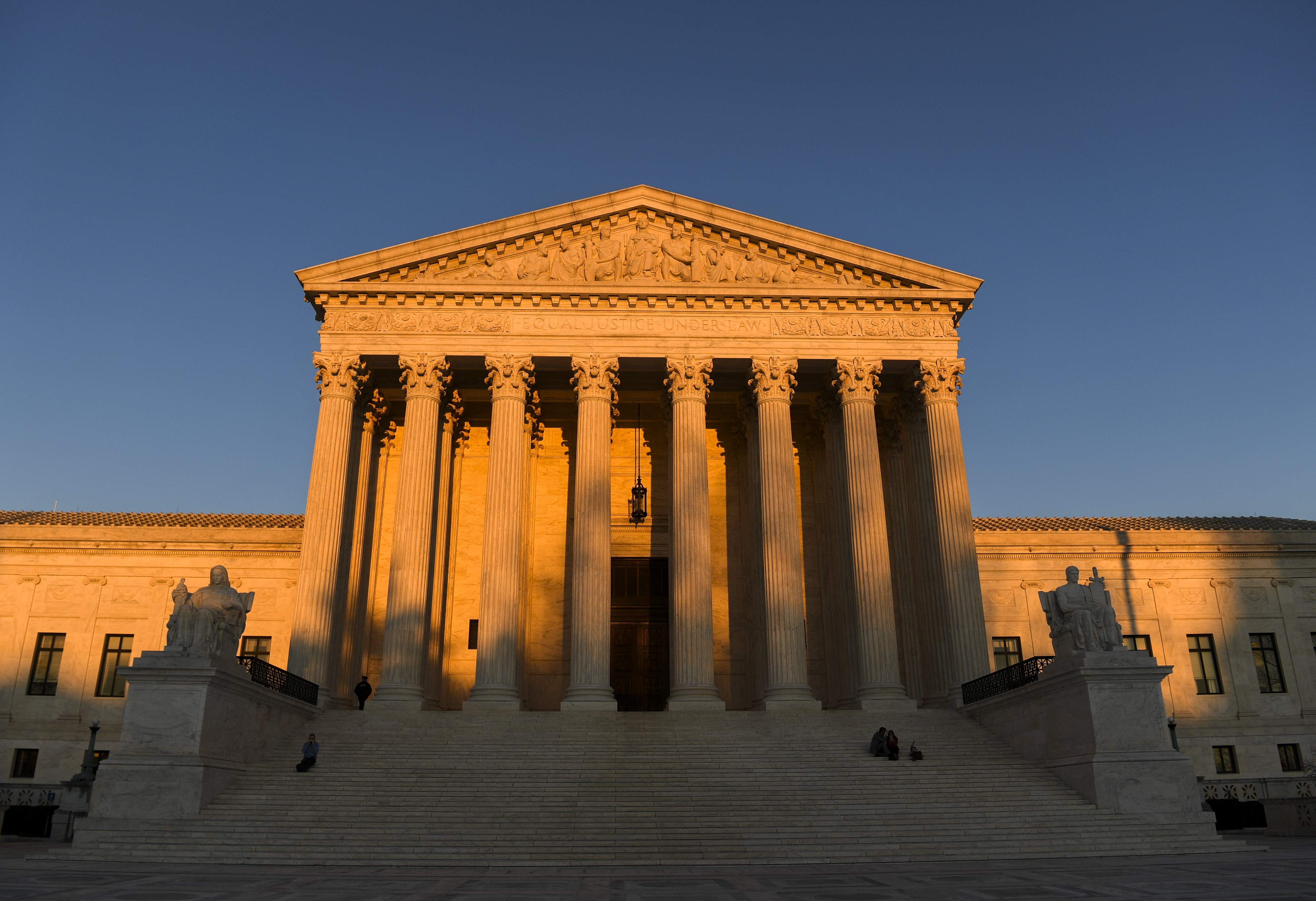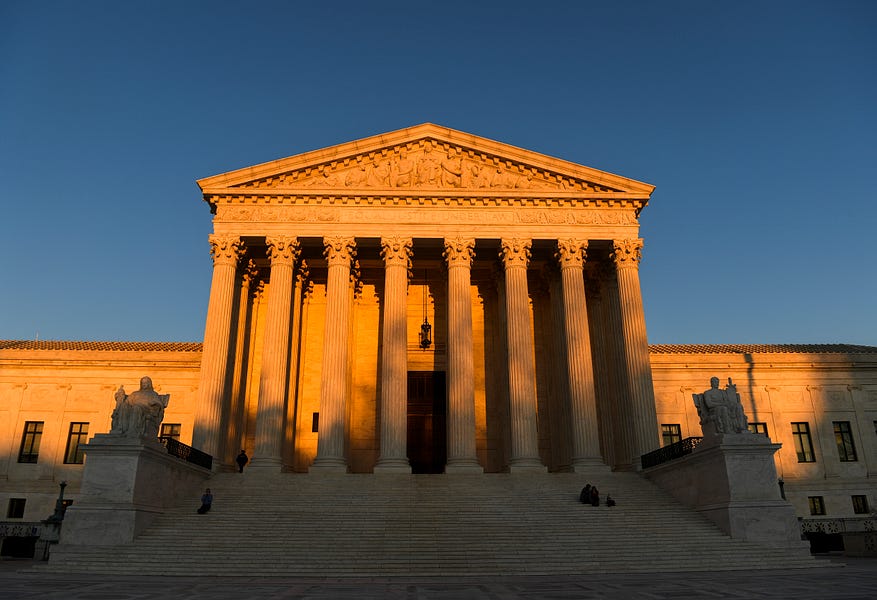Happy Monday! Can we please have 10 more hours of ESPN’s The Last Dance documentary? Or at least some live baseball?
Quick Hits: Today’s Top Stories
-
As of Sunday night, 1,486,757 cases of COVID-19 have been reported in the United States (an increase of 18,961 from yesterday) and 89,562 deaths have been attributed to the virus (an increase of 808 from yesterday), according to the Johns Hopkins University COVID-19 Dashboard, leading to a mortality rate among confirmed cases of 6 percent (the true mortality rate is likely lower, but it’s impossible to determine precisely due to incomplete testing regimens). Of 11,499,203 coronavirus tests conducted in the United States (422,024 conducted since yesterday), 12.9 percent have come back positive.

-
Less than three weeks after announcing an exploratory committee to run for the Libertarian Party’s presidential nomination, Michigan Rep. Justin Amash withdrew from the race. “I’ve concluded that circumstances don’t lend themselves to my success as a candidate for president this year,” he wrote. “Therefore, I will not be a candidate.”
-
President Trump fired State Department Inspector General on Friday night, drawing the ire of House Democrats, who say Linick was in the process of conducting an investigation into Secretary of State Mike Pompeo. Trump has now removed four people from IG roles. He fired intelligence community IG Michael Atkinson and replaced acting Defense Department IG Glenn Fine and and acting Health and Human Services IG Christi Grimm.*
-
The House of Representatives—spearheaded by Democratic leadership—approved a rule change that will allow lawmakers to cast floor votes by proxy and hold committee hearings remotely. Republican Minority Leader Kevin McCarthy was critical of the change, arguing “the Founders would be ashamed.” Democratic Rep. Jim McGovern said the change will prevent convening Congress from turning into a “super-spreader event.”
-
The House also passed the $3 trillion Heroes Act—208-199—on Friday, though, with even Democratic representatives blasting it as “bloated,” the stimulus legislation is almost certainly dead on arrival in the Senate. One Republican voted for the bill, while 14 Democrats voted against it.
-
Just a few days after the inimitable Jerry Stiller passed away, the world lost another comedy legend: Fred Willard, known for his roles in Best in Show, A Mighty Wind, and Modern Family, died over the weekend at the age of 86.
SCOTUS: A Look Ahead

The Supreme Court has been hard at work hearing arguments since October, but unless you’re a serious law geek (or an interested party to a case!) you might not have heard much about them so far this year. But May and June are the home stretch for the high court: It’s time for the justices to start handing down some big-time decisions, which means it’s high time the rest of us started paying attention too.
On the site today, Sarah has written a comprehensive guide to what to expect over the rest of the term, running through the nine biggest opinions the court will be handing down before the end of June (and a bonus huge one that’s hanging over next year’s caseload). It’s clear and (relatively) concise, and you will know what to expect when the decisions start dropping.
Here are a few cases we’ll be watching carefully.
Should sexual orientation and transgender identity be considered protected classes under Title VII of the Civil Rights Act, which forbids “sex discrimination” in hiring and firing decisions?
This big decision will answer a seemingly simple legal question: Is discrimination on the basis of sexual orientation or gender identity “sex” discrimination? Plaintiffs in two cases that were consolidated, plus a plaintiff from a separate but related case, argue the affirmative: If a gay man is fired for a relationship with another man whom a woman would be permitted to date, or a transgender woman is fired for wearing clothes a biological woman would be permitted to wear, then the deciding factor in their firing was plainly their sex.
The court must decide whether the intent of the law’s authors matter, and court watchers honed in on the questions asked at oral arguments by Justice Neil Gorsuch, a textualist in the vein of the late Antonin Scalia, who suggested the case is “really close on the textual evidence.”
“At the end of the day, should [a judge] take into consideration the massive social upheaval that would be entailed in such a decision?” he asked. “Is it more effective, more appropriately a legislative rather than a judicial function? That’s it. It’s a question of judicial modesty.”
Can Trump’s financial records be subpoenaed while he’s president?
How much authority does Congress have over the president, considered as a private citizen? That’s the question at the heart of this set of cases, which involve House Democrats’ attempts to access the president’s financial records—initially for the purpose of following up on testimony unearthed in the Russia investigation that Trump had fudged his personal assets to obtain bank loans. The White House sued, arguing Congress has essentially no authority to investigate a sitting president at all. Congress’s investigative powers are broad and have been repeatedly upheld by the court; the administration’s challenge is to convince the justices that those powers shouldn’t apply because the House is not wielding them for a legitimate legislative purpose. Again, what is likely to be the crucial question came from Gorsuch: “Why should we not defer to the House’s views about its own legislative purposes?”
May a state require doctors to have hospital admitting privileges in order to perform abortions?
The biggest abortion case before SCOTUS this year closely resembles a case decided in 2016: Whole Woman’s Health v. Hellerstedt, which held in a 5-3 decision that a Texas law requiring abortions to have admitting privileges created an “undue burden” on women’s abortion access. The tilt of the court is more conservative now, but the case may hinge on the question of whether the justices will see it as distinct from the previous decision and, if not, whether they will be willing to overturn such a recent precedent.
To what extent are religious institutions exempt from employment discrimination laws?
In a 2012 case, the Supreme Court held unanimously in Hosanna-Tabor v. EEOC that churches and other religious institutions can fire ministers without being subject to employment discrimination suits. But what about other employees who still perform religious duties, but whose ministerial role is not so clear-cut?
That’s the question posed by a pair of cases concerning two former elementary school teachers at Catholic schools, who allege they were fired for protected reasons—age for one, disability for the other. Going by Hosanna-Tabor, these are definite edge cases: Both of the teachers taught Catholic doctrine and were expected to model the Catholic faith to their students, but one was not a practicing Catholic herself. Elena Kagan suggested this indicates that “the employee doesn’t have that special role within the religious community.” But Clarence Thomas took the question the opposite way, suggesting that the subjects the teachers taught would be considered “a violation of the Establishment Clause if they did it in a public school”—seemingly indicating the function they perform is undeniably religious.
Those are just a few of the cases: And we haven’t even gotten into the legal status of the Deferred Action for Childhood Arrivals program, the constitutionality of the Consumer Finance Protection Bureau, or the Obamacare contraception mandate.
Just-In, Just-Out
“If you’re going to run a campaign for president,” Rep. Justin Amash told Declan back in January, “you need enough time to win the campaign. I’m not running for president unless I believe I can win.”
It took only 18 days, but the Michigan representative came to the conclusion over the weekend that his bid for the presidency was more quixotic than feasible. So he ended it.
Amash had spent the weeks since he launched an exploratory bid for the Libertarian Party’s presidential nomination on a national media tour, hoping to ingratiate himself with both Libertarian National Convention delegates and the American public writ large. But—as Sarah mentioned when he dropped by Advisory Opinions—Amash would have needed to garner 15 percent support in five national polls to even make the debate stage in the fall, and preliminary public polling showed him at just 5 percent. Less than 20 percent of voters had an opinion of Amash one way or the other. (In that poll, the Libertarian pulled more support from Joe Biden—the former vice president’s 50-41 percent lead over President Trump shrunk to 47-40 percent when Amash’s name was added to the mix.)
Amash maintained that a third party could break through in “the right environment,” but concluded that this—a global pandemic—was not it. “Most Americans are understandably more interested in what life will look like tomorrow than they are in broader policy debates, and news coverage has reflected those priorities,” he said. “Electoral success requires an audience willing to consider alternatives, but both social media and traditional media are dominated by voices strongly averse to the political risks posed by a viable third candidate.”
The Libertarian Party will forge ahead with its nominating convention—now virtual—over Memorial Day weekend, where one among Jacob Hornberger, Jim Gray, or Jo Jorgenson is expected to prevail. It’s unlikely any will generate the enthusiasm or popular support Amash would have.
As for Amash himself, the representative for Michigan’s third district hasn’t announced what’s next. He’ll keep the Libertarian ‘L’ next to his name, but since he “paused” his congressional re-election campaign in mid-April, top Republicans—from Kevin McCarthy to Tom Cotton—have lined up behind Peter Meijer, his GOP challenger back home in Michigan.
Worth Your Time
-
There are a lot of reasons New York has—thus far—been hit much harder by the coronavirus than California: Differences in population density, weather, and public transit systems chief among them. But this ProPublica investigation—from Joe Sexton and Joaquin Sapien—turns a critical eye on the political leadership of Bill de Blasio and Andrew Cuomo. “Three days after San Francisco and its neighboring counties were closed, [Gov. Gavin] Newsom, on March 19, imposed the same restrictions on the rest of California,” the pair write. “[San Francisco Mayor London] Breed, it turns out, had sent [New York Mayor Bill] de Blasio a copy of her detailed shelter-in-place order. She thought New York might benefit from it. New York Gov. Andrew Cuomo, however, reacted to de Blasio’s idea for closing down New York City with derision. It was dangerous, he said, and served only to scare people. Language mattered, Cuomo said, and ‘shelter-in-place’ sounded like it was a response to a nuclear apocalypse.”
-
As we mentioned up top, we were very sad to hear that legendary comic Fred Willard passed away last Friday. The Ringer’s Rob Harvilla has a great piece zeroing in on what made Willard such a master: “There was a sympathy, an innate kindness, a vivid commitment to the foibles of Real People that came through in Fred Willard’s work no matter how preposterous the setup, no matter how outlandish his role within it. It made you glad to see him, and glad to know him, or at least glad that somehow he seemed to know you.”
Something Fun
In case you weren’t watching last night and missed the GOAT’s swan song:
Presented Without Comment: The President’s Adult Sons Edition
Also Presented Without Comment
Toeing the Company Line
-
We typically endeavor here at The Dispatch not to let Twitter dictate our coverage. But when our editor-in-chief gets in a spat with AOC on the interwebs, you can rest assured there’ll be a G-File on it. Come for the grammar lesson, stay for the dissection of Ocasio-Cortez’s Motte & Bailey argument and a critique of the “Republicans are anti-science” diatribe. All that, plus a canine update, here.
-
Nobel Prize-winning economist Paul Romer dropped by the Dispatch Podcast to discuss his plan to safely and responsibly reopen states across the country. In a word: Testing. In three words: Lots of testing.
-
David’s Sunday French Press dives into ‘Weird Christianity’—which he argues is not without its perils, but is “often the beginning stage of meaningful reform” and can “represent the revolt of Christianity against Christendom.” The conclusion: “What is the value of Weird Christianity? It can help shake us out of our slumber. It can stand against Christendom when Christendom conforms to the world. What’s the danger of Weird Christianity? That it becomes more weird than Christian. The quirks become the movement. The quest isn’t to be weirdly Christian but rather merely Christian, and mere Christianity is more than weird enough.”
Let Us Know
We’ve danced around it enough these past few weeks, let’s just have at it. Jordan or LeBron? We expect this to be the liveliest comment section we’ve ever had. Don’t let us down.
Reporting by Declan Garvey (@declanpgarvey), Andrew Egger (@EggerDC), Sarah Isgur (@whignewtons), and Steve Hayes (@stephenfhayes).
Clarification, May 17: A “Quick Hits” item originally said that Donald Trump had dismissed four inspectors general from various government agencies. While he has indeed removed four IGs, two of them—Michael Atkinson and Steve Linick—were fired outright, while the other two individuals were acting IGs who were removed and replaced.
Photograph by Jonathan Newton /Washington Post/Getty Images.






Please note that we at The Dispatch hold ourselves, our work, and our commenters to a higher standard than other places on the internet. We welcome comments that foster genuine debate or discussion—including comments critical of us or our work—but responses that include ad hominem attacks on fellow Dispatch members or are intended to stoke fear and anger may be moderated.
You are currently using a limited time guest pass and do not have access to commenting. Consider subscribing to join the conversation.
With your membership, you only have the ability to comment on The Morning Dispatch articles. Consider upgrading to join the conversation everywhere.